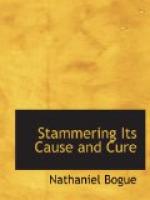In other cases, it has been found that the health was but little affected and that there was no marked departure from normal.
The physical condition of the stammerer is the result of many factors. If plenty of fresh air and exercise is supplied, and the mind is well-employed so that the worry over the trouble does not disturb the stammerer, then the chances for being in a normal physical condition are good.
On the other hand, the boy of studious disposition, who is somewhat of a bookworm, keeps close to the house and does not play with other children of his age, will probably find time for much introspection, and on this account, as well as on account of the lack of fresh air and exercise, will probably be in a physical condition that of itself demands careful attention.
It has been found in examinations of stammerers and stutterers, however, that they are usually of below normal chest expansion and that the health, while not particularly bad, is subject to a great improvement as a result of the proper treatment for stammering.
Charles Kingsley, the noted English divine and writer, and himself a stammerer many years ago, has the following to say regarding the effect of stammering on the body: “Continual depression of spirit wears out body as well as mind. The lungs never act rightly, never oxygenate the blood sufficiently. The vital energy continually directed to the organs of speech and there used up in the miserable spasm of mis-articulation cannot feed the rest of the body; and the man too often becomes thin, pale, flaccid, with contracted chest, loose ribs and bad digestion. I have seen a boy of twelve stunted, thin as a ghost and with every sign of approaching consumption. I have seen that boy a few months after being cured, upright, ruddy, stout, eating heartily and beginning to grow faster than he had ever grown in his life. I never knew a single case in which the health did not begin to improve then and there.”
CHAPTER IX
DEFECTIVE SPEECH IN CHILDREN
(1) The pre-speaking period
From the standpoint of speech development, the life of any person between the time of birth and the age of twenty-one years, may be divided into four periods as follows:
From Birth to Age 2—pre-speaking
period.
Age 2 to Age 6—formative-Setting
period
Age 6 to Age 11—speech-Setting
period
Age 11 to Age 20—adolescent
period
This chapter will deal only with the first period of the child’s speech-development, beginning with birth and taking the child up to his second year. The speech disorders of the later periods will be taken up in the three following chapters.




